IAT Programs: SoC
2024 Summer Study Abroad in Northern Ireland
In the Summer of 2024, ECU students had an opportunity to study abroad in Northern Ireland. Drs. Rebecca Dumlao and Sachiyo Shearman, two professors in the School of Communication, led the group of students to study abroad for 12 days in Belfast, Northern Ireland. Students had an opportunity to take two Communication courses (or six credit hours) in Communication – COMM4130 Conflict and Communication and COMM4040 Media Culture and Society. In COMM4130, students learned key factors, theory, and research in analyzing the process of interpersonal conflict communication, conflict resolution, negotiation, and peace-making. In COMM4040, students learned how media, culture, and society intersect, examining how media shapes one’s perspectives, cultures, and worldviews.
Before the departure, we had online coursework and virtual presentations, inviting various people from Belfast to be guest speakers. Students studied the history and culture of Northern Ireland with an emphasis on the history before, during, and after the 30 decades of conflicts (between 1969 to 1998) in Northern Ireland called “the Troubles.” While in Belfast, students get to know and work creatively with youth who call Northern Ireland home as they participate in community-based learning. Students had an opportunity to work with youth and learned about the culture and daily lives of people in Belfast by interacting and communicating with them firsthand.
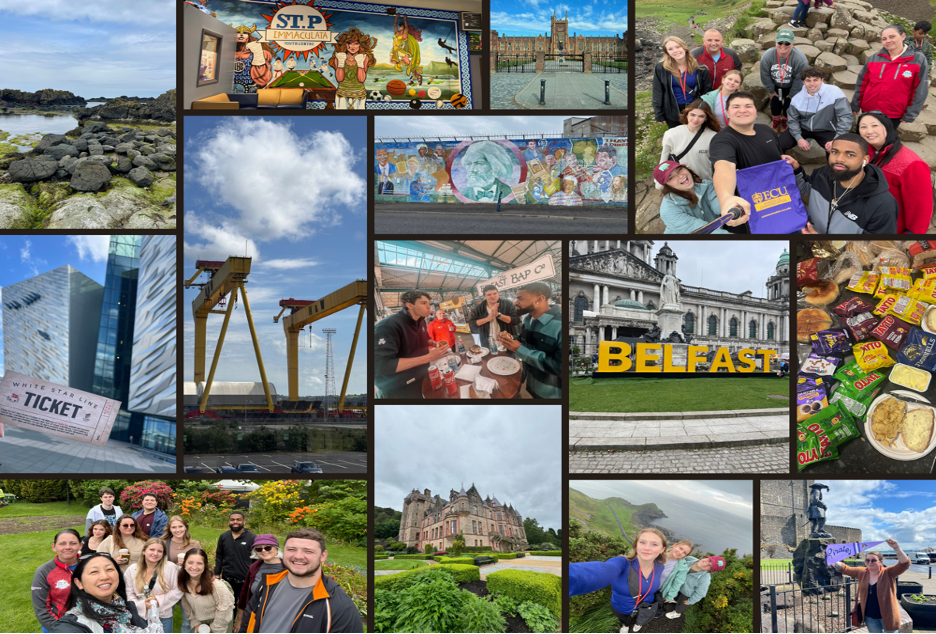
Drs. Rebecca Dumlao and Sachiyo Shearman worked with a non-profit organization called Amizade (https://amizade.org/). This organization is a leader in offering global service-learning opportunities to students. Amizade worked with the leaders in Belfast and connected us with the local people serving at the youth centers and various guest speakers who offered a variety of perspectives relating to the Troubles in Northern Ireland and the current situations decades after the Troubles in Northern Ireland. Our students visited four local youth centers: St. Peter’s Youth Center, Holy Trinity Youth Center, and Forth Springs Youth Center. Many of our students worked almost every weekday in three youth centers, connecting with local young people.
We had a variety of guest speakers from both sides of the conflict, Republican, Ireland, or Catholic, as well as Loyalist, British, or Protestant, who survived the 1969-1998 Troubles and navigated peacemaking in the decades after the Conflicts in Northern Ireland. One of the speakers, Mr. William, educated us on diverging interpretations of history relating to the Troubles. Mr. Liam Stone questioned whether we can forgive the person who wronged us while educating us about peacebuilding. Another guest speaker, Ms. Anne Marie McKee, who appealed to the violent act, caught and jailed during the Troubles, shared her experiences of being in jail during the Troubles and how she currently works with youth to promote education. All the guest speakers shared their firsthand experiences of surviving the conflict in Northern Ireland and how they are promoting peace.
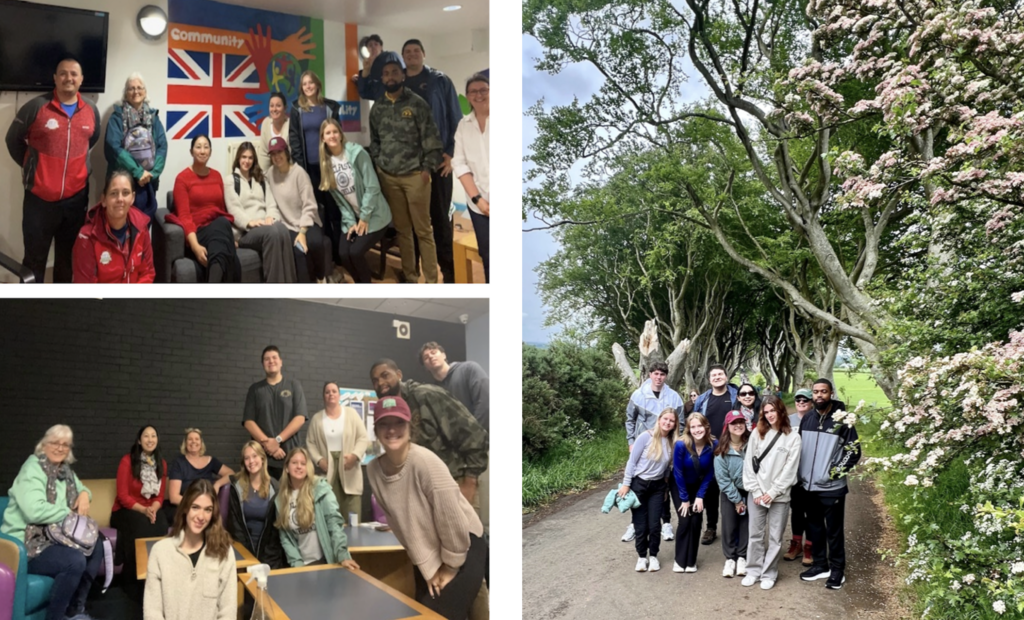
On the day we did not have service or guest speakers, we visited the Atrium Coast in Northern Ireland. Although it was not the warmest day we visited, we enjoyed the beach on the Antrim coast, and some students dipped themselves in the water. We enjoyed hiking around the Giants Causeway, exploring the Carrickfergus castle, and strolling the avenue of the dark hedges. In Belfast, we explored the Belfast City Hall, City Market, and St. George’s Market and joined in the tour of the Titanic Museum and the surrounding area. As a group, we learned a lot about the culture and history of Northern Ireland.
Here are some personal statements from two of our students who went on the trip!
For the SOC summer study abroad program, we traveled to Belfast, Northern Ireland, for ten days at the end of May. In preparation for the trip, we engaged with course materials on Conflict and Communication under the guidance of Dr. Shearman and Media, Culture, and Society with Dr. Dumlao. We also held Zoom calls with our partners at Amizade to better understand the ongoing conflicts in Northern Ireland and prepare for the culture we would be experiencing. Once there, we could apply what we learned to the youth centers we volunteered at within the Belfast community on both sides of the wall. Additionally, we gained further insights through seminars with respected individuals from each side of the divide, allowing us to receive an unbiased perspective on the prevailing conflict culture. This trip was one of the best experiences I’ve had at ECU because of the people involved. The camaraderie among our group, the incredible individuals from Amizade, and the children and volunteers at the youth centers, particularly St. Peter’s, truly made the journey unforgettable. – Mallory Ramsay
This study abroad experience in Belfast, Northern Ireland, has greatly broadened my perspective of the world and allowed me to experience and immerse myself in the Belfast culture, which I was unfamiliar with. While interacting and working with others on this trip, I gained firsthand experience and understanding of different customs, traditions, and ways of life. This exposure to diverse perspectives of the Belfast community led me to develop an open-minded mindset on this trip. Listening to each of the guest speakers who told their original experiences during the Troubles greatly impacted me on this trip. We heard from Liam Stone, Ann Marie McKee, Ivan Cross, and William Mitchell. Each of these individuals comes from different backgrounds, religions, or political parties, resulting in their unique stories during the conflict. Hearing each perspective allowed me to process and assess things from both sides, Loyalist and Republican, in an attempt to understand each point of view. Having the opportunity to explore Belfast, volunteer with the youth, and experience a unique culture and community was unforgettable. I will forever carry what I learned on this trip with me.” – Megan Milter
The lessons we learned, and our experiences were not ones we could have learned in a classroom. This trip required us to expose ourselves to new situations filled with different people and a unique culture we were unfamiliar with before. This trip allowed us to walk away with a newfound appreciation for learning about other cultures and immersing ourselves in a new community. It will further build your personal, professional, and community-focused growth and allow you to become an active global citizen. – Megan and Mallory
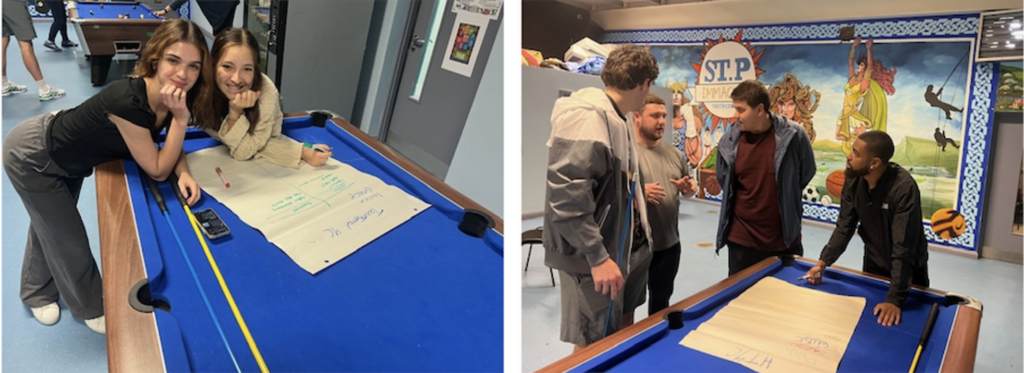
If you want to contribute to St Peter’s Youth Center, where Megan and Mallory volunteered during their time in Belfast, scan the code or search the link below. By choosing this study abroad, you will likely have the pleasure of working with this youth center!
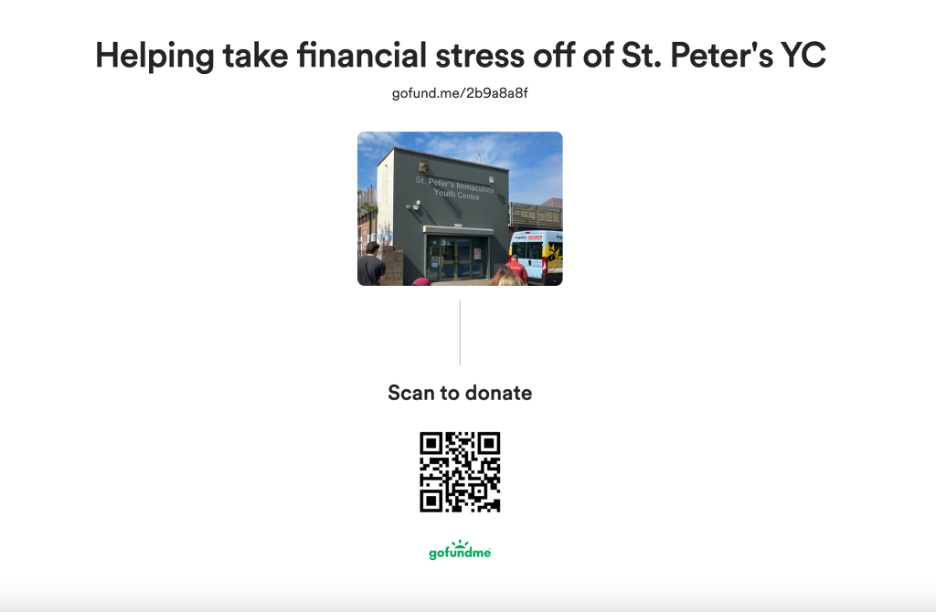
Poland
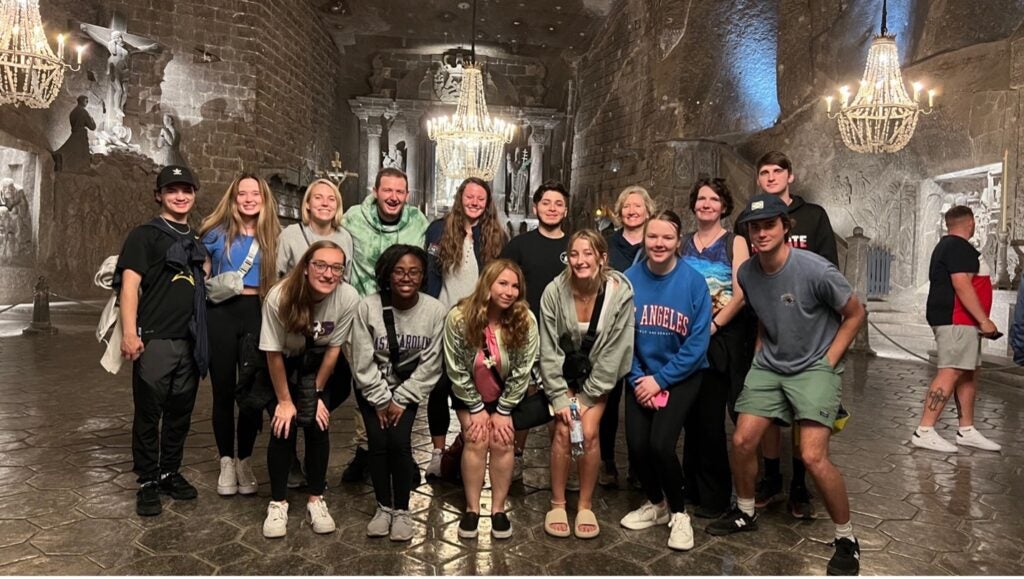
Wieliczka Salt Mines
The School of Communication took 12 students on an 18-day Study Abroad to Poland in May 2023, with the theme of “Narrating Cultural Heritage.” Ten were undergraduate students; two were graduate students. The courses offered included:
- COMM 3180 – Intercultural Comm
- COMM 3390 – International News
- COMM 3060 – Special Topics
- COMM 6140—Special Topics
The trip began with a week in Krosno, Poland, with our partner university, the State Academy of Applied Sciences (formerly Krosno State College). Students had classes with three professors at the university, who led presentations and lectures relating to American and European cultural differences, the understanding of political metaphors, and the high-profile “Witcher” book and gaming series, which has its origins in Poland.
While there, ECU students also spent time with numerous international students who attend the State Academy. Our students produced and shared a presentation about the unique “cultures” of ECU and Greenville, and groups or pairs of the international students did the same with presentations from their home countries, ranging from Ireland to Spain, Portugal to Ukraine to Turkey and more. This was followed by a reception with specialty foods from most of the countries represented.
We spent a day touring the 17th century baroque Castle Museum in Lancut, an afternoon exploring the renowned Krosno Glass Heritage Center, and a day in Bardejov, Slovakia, which has a medieval town center, followed by time in a shopping mall in Poland.
Lastly, students had a presentation by Adrian Krzanowski, the founder and an owner of the Krosno24.pl local news website.
On our eighth day, we left Krosno for Krakow, stopping to spend a day in the world famous seven-century-old Wieliczka Salt Mines. Our six days in Krakow included a partnership with the Jagiellonian University in Kraków, Faculty of Philology. The university arranged faculty lectures and discussions for us about national narratives of Russian aggression in Ukraine, international cultural stereotyping; COVID-19 humor in Poland, Belarus and Romania; and about “media narration” of the war in Ukraine. We had a virtual presentation from Marcin Wrona, the White House correspondent for TVN, Poland’s biggest television news network.
As before, our students met numerous international students in Krakow. We had a guided tour of the city, toured the Schindler’s Factory museum; had a walking tour of Kazimierz, Kraków’s historic Jewish district; and attended the “Kaczmarek Cinema” Concert at the Film Music Festival in the ICE Kraków Congress Centre. We also spent a day on a guided tour of the Auschwitz-Birkenau Concentration Camp Museum.
On Day 14, we travelled by train to Warsaw, the capital of Poland. Our time there included a visit to the Palace of Culture viewing terrace, a walking tour of the Warsaw Old Town, visit to the Royal Castle, a Chopin music piano recital, a tour of the Warsaw Uprising Museum, and the Polin Jewish Museum.
Professors with Warsaw University gave lecture presentations to our students about the literary construction of Polish exceptionalism and about the significance of translation for international communication. Again, our students met numerous international students attending Warsaw University from countries throughout Europe, Central Asia, and even from Russia.
Warsaw is also where we met with, and had presentations with, several international journalists, including:
- TVN/Warner Discovery journalist Bianca Zalewska, who has been covering the war in Ukraine since the first Russian invasion in 2014. She was recognized at the White House in 2023 with the International Woman of Courage award.
- Vanessa Gera, the Associated Press chief correspondent for Poland.
- Tomasz Grzywaczewski, TVP Polish public television war correspondent to Ukraine
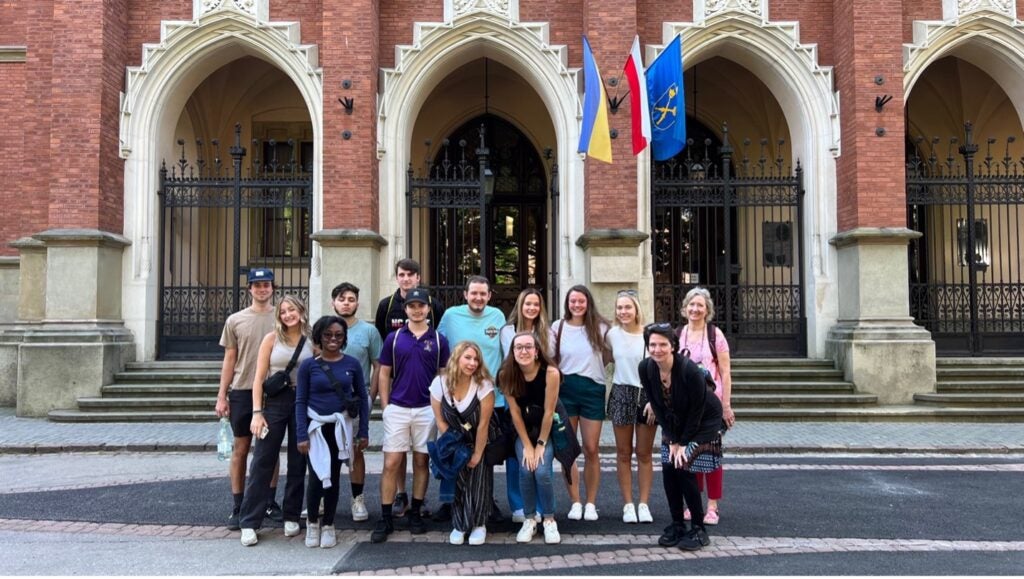
Outside Jagellonian U in Krakow.